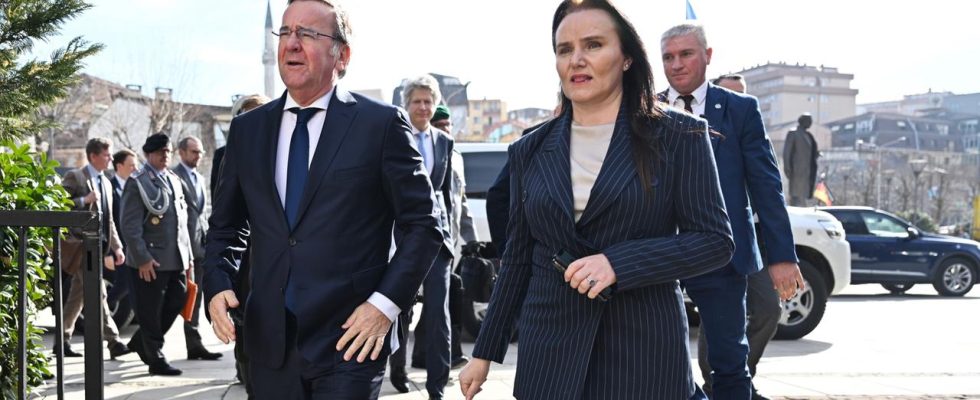Clear words in Pristina: With a view to the tensions with Serbia, Defense Minister Pistorius called for diplomatic efforts. Germany is supporting Kosovo as planned. The goal is EU membership.
Federal Defense Minister Boris Pistorius has called on Serbs and Albanians to negotiate after the recent tensions. “The order of the day is dialogue and de-escalation,” said the SPD politician at a meeting with President Vjosa Osmani in Pristina. “The Chancellor has underlined very clearly that the future of the Western Balkans lies in the European Union. And that must be the path,” said Pistorius.
In this situation, no one can and should have an interest in “exacerbating the situation”. The USA, Germany and the other NATO partners have not provided security with up to 50,000 soldiers since the 1990s “in order to watch now or in the future how the situation here destabilizes again,” said the minister.
At the same time, Pistorius assured the government in Kosovo that Germany would continue to provide military support following the tensions with Serbia. The Bundeswehr is on schedule with plans to send additional soldiers, said Pistorius.
EU membership “must remain a common goal”
Russia has had very strong interests in the Western Balkans since the times of the Soviet Union, said Pistorius. “That’s why it’s all the more important that we send clear signals, that we make it clear that we stand with the countries that stand for stability, security and freedom.”
Pistorius announced that he would also clearly address the situation in Belgrade. “Serbia wants to join the European Union, just like Kosovo and other Western Balkan countries. That must remain our common goal,” he said. A set of values, common goals and shared responsibility must be adhered to.
“Anyone who wants to do that can’t dance at two weddings at the same time,” said Pistorius, who was probably also alluding to Serbia’s cooperation with Russia. The clearer the communication is, “the better for everyone involved,” said Pistorius.
Document on Serbia’s involvement
Kosovo’s President Osmani called for increased protection of the border with Serbia, through which weapons smuggling runs into the north of Kosovo. There must also be a clear signal to the Serbian government that acts of violence will not be tolerated. The security forces in Kosovo say they have confiscated weapons and military equipment for up to 400 fighters after exchanges of fire with Serbian paramilitaries last year.
In addition, an analysis of confiscated documents and weapons of war shows that the Serbian state was equipped with equipment as well as close connections to the apparatus of Serbian President Aleksandar Vucic, according to an investigation report by the Kosovo government. The 51-page paper from the Kosovo Foreign Ministry, for which photos and videos, data sets and identity cards were examined, was available to the dpa news agency.
In its investigation, the Kosovo government lists seized war weapons that were confiscated in the presence of the Kosovo Protection Force KFOR and the EU rule of law mission EULEX. These include two armored trucks, 29 off-road vehicles, 66 assault rifles, 80,000 rounds of ammunition as well as mortars, hand grenades, mines, plastic explosives, sniper rifles and communications equipment. The origin and production dates – some as recently as 2022 – could therefore also be reconstructed using the enclosed documents.
Tensions at their peak in September
The tensions of the past few years reached a climax on September 24th last year: a 30-strong, heavily armed Serbian commando force fought battles with the Kosovo police in the town of Banjska near Mitrovica in Serb-inhabited northern Kosovo. Three Serbian attackers and a Kosovar police officer were killed.
The Kosovo Serb politician and businessman Milan Radoicic claimed responsibility for the attack. He claimed that he carried out the action on his own initiative and did not inform any official authorities in Serbia about it. However, the government in Pristina considers it impossible that Radoicic acted without help.
The investigation report argues that the Serbian attackers’ goal was to clear a corridor so that they could send in more military supplies. The report also warns about Serbia’s cooperation with the Russian state and President Vladimir Putin: “If the West continues to allow Vucic to escalate and does not take unambiguous, clear steps to deter Vucic and Putin from further escalations, the Balkans could once again be in one War sinks.”
Declaration of Independence 16 years ago
Even against the backdrop of a deteriorating security situation in Kosovo, the Bundeswehr will increase its involvement in KFOR. Around 90 men and women from the Bundeswehr are currently deployed with the Kosovo force KFOR (Kosovo Force) and the NATO Advisory and Liaison Team (NALT). From April onwards, a Bundeswehr company with more than 150 additional soldiers is to be deployed in Kosovo.
Kosovo, which is now inhabited almost exclusively by Albanians, declared itself independent in 2008. More than 100 countries, including Germany, recognize independence, but not Serbia, which is demanding the return of its former province.
Mario Kubina, ARD Berlin, tagesschau, February 5th, 2024 5:23 p.m

